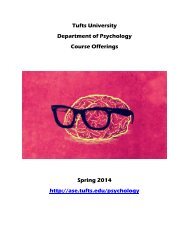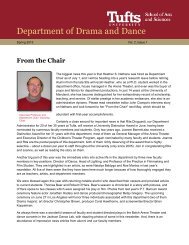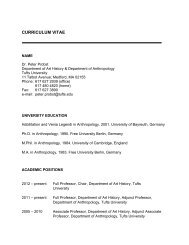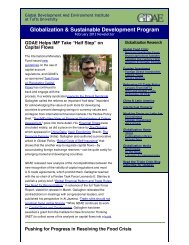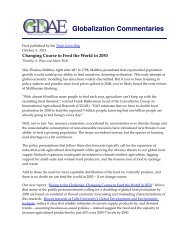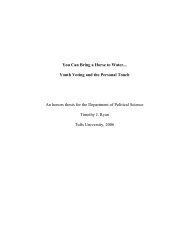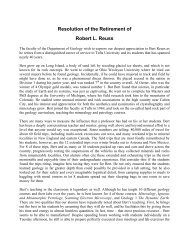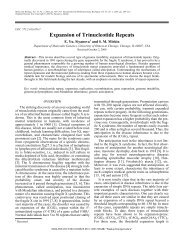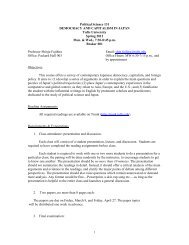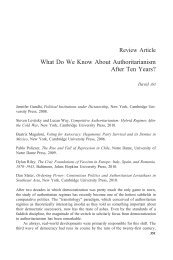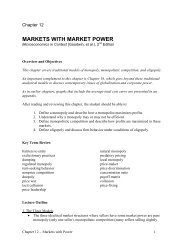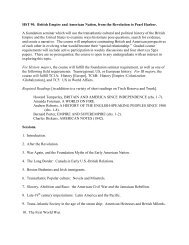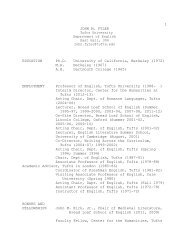Fall 2011 - Tufts University
Fall 2011 - Tufts University
Fall 2011 - Tufts University
Create successful ePaper yourself
Turn your PDF publications into a flip-book with our unique Google optimized e-Paper software.
STUDENT SPOTLIGHT: Carmen Gutierrez<br />
When student Carmen Gutierrez (’12) was awarded a Jonathan M. Tisch College of Citizenship and Public Service<br />
fellowship this past summer, she expected to help teachers in the Somerville, Massachusetts, public schools with<br />
curriculum development and program planning. But as she and her supervisor began to develop the role she would<br />
play in the Summer Program for English Language Learners (SPELL) at the Argenziano School, Gutierrez quickly found<br />
herself putting her occupational therapy lens to work. Meeting individually and in small groups with at-risk English language<br />
learners (ELL), Gutierrez helped engage students in the summer<br />
program, which is designed to improve academic success for emerging<br />
English speakers. “I created suggestions for approaches to use with the<br />
students and got to interact with them directly, as well as facilitate their<br />
learning with teachers in the classroom. It was an amazing experience,”<br />
she says.<br />
Gutierrez’s fellowship was part of Project PERIS (Partnering for Economic<br />
Recovery Impact through Service), a Tisch College initiative that<br />
engages community partners, faculty, and university and high school<br />
students in a collaborative planning process that delivers needed services<br />
for economic recovery. According to Gutierrez, the SPELL program addresses<br />
the needs of the many ELL students in the diverse, multicultural<br />
community of Somerville. “Some of these students are at risk of joining<br />
gangs and performing poorly in school, in part because of language and<br />
cultural barriers. My job was to identify needs, provide emotional support,<br />
and help with functional tasks so that the students could perform<br />
better in school and improve their engagement and interest in school as<br />
much as possible,” she explains.<br />
Gutierrez’s occupational therapy perspective came in handy as she<br />
implemented goal-setting, journaling, and self-reflective activities to help<br />
students plan for academic success. She engaged struggling readers in<br />
games and classroom activities and assisted Spanish-speaking students<br />
in using their English skills to problem-solve.<br />
For Gutierrez, one of the best parts of the fellowship was being able to<br />
observe and work with the children and teachers directly in the classroom. Her occupational therapy training showed<br />
her the importance of having an interdisciplinary mindset when helping students at risk. “Most schools simply don’t<br />
have the resources to provide this kind of support,” she says. “For students at risk, the functional emphasis of occupational<br />
therapy provides a perfect framework, and therapists can help empower students with the skills necessary to be<br />
successful in school.”<br />
Disciplines, continued from page 2<br />
In an effort to draw a clearer picture of<br />
what this relatively new service model looks<br />
like in practice, Morris’ OTD leadership<br />
project, School-based collaborative consultation<br />
practices: Perspectives of collaborating<br />
occupational therapist and classroom teacher<br />
dyads, examined the perspectives of 12<br />
teacher/occupational therapist dyads in several<br />
Massachusetts public schools. Online<br />
diaries provided valuable answers about<br />
Courtesy of Carmen Gutierrez<br />
team members’ collaborative consulting<br />
experiences.<br />
Morris found that “collaborative consultation<br />
is still a developing trend. Service<br />
providers understand the theory behind it,<br />
but are still transitioning into putting the<br />
concept into practice.” Morris believes this<br />
model of service delivery has many benefits,<br />
and she would like to see it expanded<br />
through professional development. “Traditionally,<br />
each provider would work with the<br />
child outside the classroom, independent<br />
of the teacher. But in collaborative consultation,<br />
we are working in the classroom,<br />
together. That not only makes us more accessible<br />
to one another, but also allows us to<br />
provide contextual services—services that<br />
support the student’s ability to participate<br />
in the normal routines of school in typical<br />
places such as the cafeteria and playground.<br />
This, in turn, fosters better outcomes.” OT<br />
News & Notes fall <strong>2011</strong> 3<br />
Courtesy of Carmen Gutierrez



